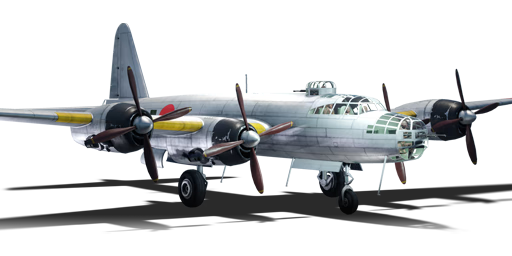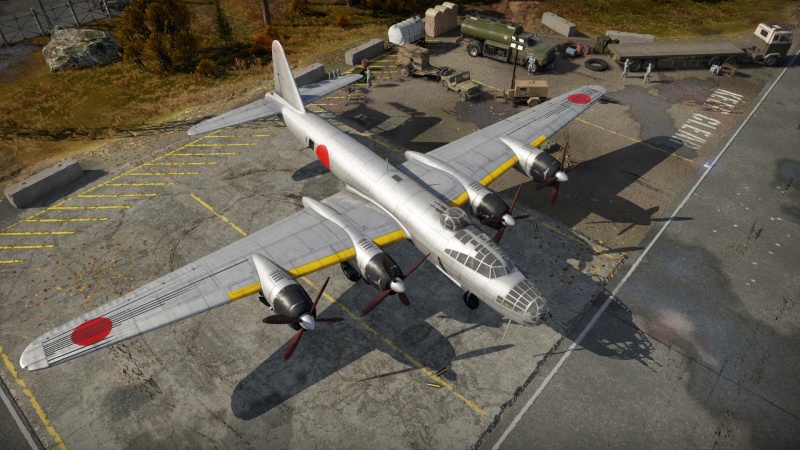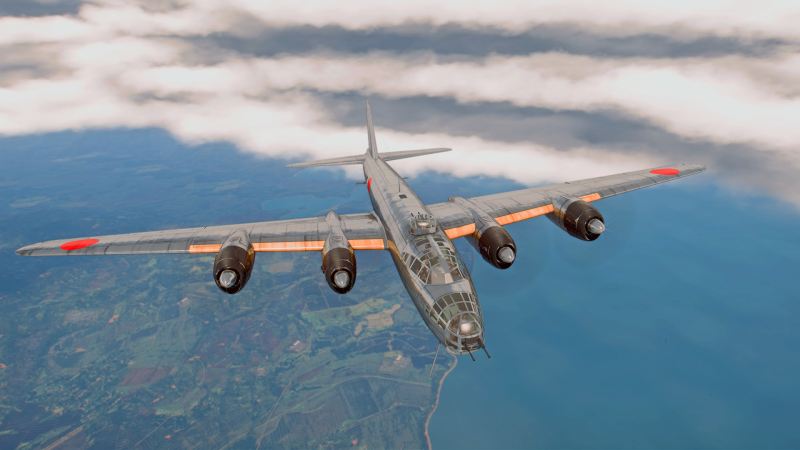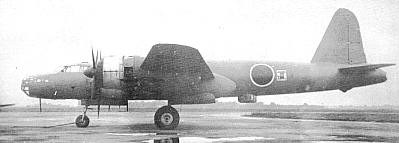Difference between revisions of "G8N1"
(→Usage in battles: Added gunshipping as a strategy) (Tag: Visual edit) |
(→Usage in battles) |
||
| Line 127: | Line 127: | ||
== Usage in battles == | == Usage in battles == | ||
<!-- ''Describe the tactics of playing in the aircraft, the features of using aircraft in a team and advice on tactics. Refrain from creating a "guide" - do not impose a single point of view, but instead, give the reader food for thought. Examine the most dangerous enemies and give recommendations on fighting them. If necessary, note the specifics of the game in different modes (AB, RB, SB).'' --> | <!-- ''Describe the tactics of playing in the aircraft, the features of using aircraft in a team and advice on tactics. Refrain from creating a "guide" - do not impose a single point of view, but instead, give the reader food for thought. Examine the most dangerous enemies and give recommendations on fighting them. If necessary, note the specifics of the game in different modes (AB, RB, SB).'' --> | ||
| − | In all game modes, the G8N1 excels | + | In all game modes, the G8N1 "Renzan" excels in its traditional heavy bomber role by targeting strategic objectives like air bases and factories. |
| − | If attacked, the G8N1 can | + | If attacked, the G8N1 can defend itself quite effectively. It is recommended to "line up" an enemy aircraft by manoeuvring so that all of your tail turrets are facing it. Start firing when the enemy is approximately 1 km away. Ensure proper leading, and if the shells are not hitting, watch the tracers and adjust accordingly. Unfortunately, even minor wing damage can result in a "death spin," where the plane becomes unbalanced and spirals slowly toward the ground. It is nearly impossible to recover from such a situation, and this can happen in all game modes. Despite this issue, the Renzan can be even more of a fortress than the B-17 "Flying Fortress." |
| − | Due to the | + | Due to the G8N1 Renzan's formidable defensive armament and unusually high rip speed and G-limit characteristics (for a bomber), pilots can employ more ambitious strategies than with typical bombers. One such tactic is using the Renzan to intercept enemy bombers before they reach friendly bases. An even more unconventional—and often inadvisable—strategy is known as "gunshipping." Instead of flying the Renzan in a traditional high-altitude bombing role, pilots can engage in offensive manoeuvres by entering enemy climb patterns. This takes advantage of the Renzan's high rip speed, G-limits, and powerful defensive turrets against enemy fighters. |
| + | |||
| + | The layout of the Renzan’s armament is particularly effective when an enemy is approaching from the rear, as at least two turrets equipped with dual 20 mm cannons can be brought to bear. In such situations, the Renzan pilot can pitch the aircraft upward, often causing the pursuing enemy to stall, making them an easy target. Additionally, the Renzan can exploit the inattentiveness of enemy pilots who are side-climbing, catching them off-guard for a quick kill. However, this approach is generally not recommended, as the Renzan’s airframe is vulnerable to damage from the heavy weaponry often encountered at this battle rating. | ||
=== Manual Engine Control === | === Manual Engine Control === | ||
Latest revision as of 11:26, 4 August 2024
Contents
Description
The G8N1, designated as Renzan (連山), was a four-engine heavy bomber designed by Nakajima Aircraft Company for the Imperial Japanese Navy in 1943. It was intended to be a long-range land-based attack plane that could carry a large bomb load and reach speeds of 590 km/h. The first prototype flew in October 1944 and was delivered to the Navy for testing in January 1945. However, the project faced many difficulties due to material shortages, especially aluminium, and Allied air raids. Only four prototypes and three production models were completed before the program was cancelled in June 1945.
It was introduced in Update 1.29. The Renzan is a formidable machine with six powerful 20 mm Type 99 Model 2 Mk 5 cannons to deter enemy planes. It can withstand multiple attacks with its strong defensive armament, high ammo count, and decent armour (for a Japanese aircraft). However, it has a low bomb load of 2,400 kg, making it the least effective heavy bomber in-game for ground attack. The Renzan can still pose a threat in formation or with allies. Unlike other heavy bombers like the Lancaster B Mk I, the Renzan can defend itself without fighter escort, to some extent. Another distinctive feature of the Renzan is its four-engine design. It is one of the few Japanese planes with four engines, along with the G5N1 and the premium B-17E Flying Fortress. This enhances the Renzan's survivability and chances of returning to base.
- Nicknames
- Official Designation: 連山 (Renzan, "Mountain Range")
- Allied reporting name: Rita
General info
Flight performance
| Characteristics | Max Speed (km/h at 7,620 m) |
Max altitude (metres) |
Turn time (seconds) |
Rate of climb (metres/second) |
Take-off run (metres) | |||
|---|---|---|---|---|---|---|---|---|
| AB | RB | AB | RB | AB | RB | |||
| Stock | 493 | 475 | 25.6 | 26.3 | 4.9 | 4.9 | 489 | |
| Upgraded | 534 | 512 | 23.7 | 24.4 | 9.9 | 7.2 | ||
Built for long range and speed, the G8N1's flight performance is a massive improvement over its predecessor, the G5N1. The plane handles and accelerate as great as a medium bomber, with good climb rate at high altitude. Because of this, the G8N1 is quite comfortable to fly, and its superior flight characteristic will help in either avoiding the enemy or facing your defensive armaments at any would-be chasers.
One peculiar characteristic of the G8N1 is its unusually high wing rip speed of 680 km/h IAS, this allows the plane to dive and exceed the air speed of over 700 km/h in a dive. This unusual trait can be exploited in a high-risk, high rewards "fast bomber" gameplay by simply do a shallow dive into the enemy base before they arrive to intercept you.
Like the G5N1, the G8N1 is equipped with a tricycle landing gear that allows it to utilize small airfield when needed. Though due to the landing gear's slow deployment speed and ineffective landing flaps and brakes, the plane will occasionally struggle to lose its speed during the landing process and may results into overshooting the runway. Thus, care must be taken in managing the air speed before landing on small airfield or the player can use the safer option of larger airfield instead.
Details
| Features | ||||
|---|---|---|---|---|
| Combat flaps | Take-off flaps | Landing flaps | Air brakes | Arrestor gear |
| ✓ | ✓ | ✓ | X | X |
| Limits | ||||||
|---|---|---|---|---|---|---|
| Wings (km/h) | Gear (km/h) | Flaps (km/h) | Max Static G | |||
| Combat | Take-off | Landing | + | - | ||
| 680 | 332 | 322 | 270 | ~3 | ~2 | |
| Optimal velocities (km/h) | |||
|---|---|---|---|
| Ailerons | Rudder | Elevators | Radiator |
| < 340 | < 350 | < 410 | > 280 |
Survivability and armour
- 13 mm Steel plates behind the nose gunner
- 13 mm Steel plates behind the pilots
- 13 mm Steel plates behind the dorsal gunner
- 13 mm Steel plates in front of beam turret gunners
- 13 mm Steel plate in the tail gunner's seat
Modifications and economy
As with any propeller-driven bomber, speed is not necessarily important. Start off by researching all of the payload and turret modules, as these are more worthwhile than upgrading the aircraft's speed or turn time. Upgrading crew skills such as reload speed and ground repair time are also beneficial. Upgrading the gunners also gives you a massive defensive boost but costs a lot of crew points. Gunner vitality should be number one on the list of crew upgrades. Unlocking the turret belts modules also allows one to fill the turret belts with more armour piercing or high explosive rounds, furthering the G8N1's survivability.
Armaments
Suspended armament
The G8N1 can be outfitted with the following ordnance:
- 18 x 60 kg Navy Type 97 Number 6 bombs (1,080 kg total)
- 8 x 250 kg Navy Type Number 25 Model 2 bombs (2,000 kg total)
- 3 x 800 kg Number 80 Mod. 1 bombs (2,400 kg total)
- 3 x 800 kg Navy Type 99 Number 80 AP bombs (2,400 kg total)
- 2 x 1,500 kg Navy Type 3 Number 150 AP bombs (3,000 kg total)
Defensive armament
One of the distinguishing features of this aircraft is its 20 mm cannons, which are not the standard Type 99, Model 2 ones. They are actually the upgraded Type 99, Model 2, Mark 5 version, which offers a significant improvement over the earlier models. The main difference is that the Mark 5 cannons use a belt-fed ammunition system that enables them to fire longer bursts than the drum-fed ones, which are limited to 100 rounds. The Mark 5 cannons also have a higher fire rate of about 720 RPM, compared to the 500 RPM of the regular Type 99 Model 2 cannons.
The G8N1 is defended by:
- 2 x 20 mm Type 99 Model 2 cannons, dorsal turret (300 rpg = 600 total)
- 2 x 20 mm Type 99 Model 2 cannons, ventral turret (200 rpg = 400 total)
- 2 x 20 mm Type 99 Model 2 cannons, tail turret (300 rpg = 600 total)
- 2 x 13 mm Type 2 machine guns, nose turret (200 rpg = 400 total)
- 1 x 13 mm Type 2 machine gun, 2 x beam turrets (300 rpg)
Usage in battles
In all game modes, the G8N1 "Renzan" excels in its traditional heavy bomber role by targeting strategic objectives like air bases and factories.
If attacked, the G8N1 can defend itself quite effectively. It is recommended to "line up" an enemy aircraft by manoeuvring so that all of your tail turrets are facing it. Start firing when the enemy is approximately 1 km away. Ensure proper leading, and if the shells are not hitting, watch the tracers and adjust accordingly. Unfortunately, even minor wing damage can result in a "death spin," where the plane becomes unbalanced and spirals slowly toward the ground. It is nearly impossible to recover from such a situation, and this can happen in all game modes. Despite this issue, the Renzan can be even more of a fortress than the B-17 "Flying Fortress."
Due to the G8N1 Renzan's formidable defensive armament and unusually high rip speed and G-limit characteristics (for a bomber), pilots can employ more ambitious strategies than with typical bombers. One such tactic is using the Renzan to intercept enemy bombers before they reach friendly bases. An even more unconventional—and often inadvisable—strategy is known as "gunshipping." Instead of flying the Renzan in a traditional high-altitude bombing role, pilots can engage in offensive manoeuvres by entering enemy climb patterns. This takes advantage of the Renzan's high rip speed, G-limits, and powerful defensive turrets against enemy fighters.
The layout of the Renzan’s armament is particularly effective when an enemy is approaching from the rear, as at least two turrets equipped with dual 20 mm cannons can be brought to bear. In such situations, the Renzan pilot can pitch the aircraft upward, often causing the pursuing enemy to stall, making them an easy target. Additionally, the Renzan can exploit the inattentiveness of enemy pilots who are side-climbing, catching them off-guard for a quick kill. However, this approach is generally not recommended, as the Renzan’s airframe is vulnerable to damage from the heavy weaponry often encountered at this battle rating.
Manual Engine Control
| MEC elements | ||||||
|---|---|---|---|---|---|---|
| Mixer | Pitch | Radiator | Supercharger | Turbocharger | ||
| Oil | Water | Type | ||||
| Not controllable | Controllable Not auto controlled |
Not controllable Not auto controlled |
Controllable Not auto controlled |
Combined | Not controllable 1 gear |
Auto controlled |
Pros and cons
Pros:
- Durable airframe clad with several armour plates, able to withstand multiple hits before going down
- Has two pilots protected by multiple layers of armour, thus pilot snipes are unlikely to be fatal
- Quite fast and manoeuvrable for its size
- Good flight performance and climb rate at high altitude (above 5000 m)
- Heavy defensive armaments in the form of 20 mm autocannons and 13 mm machine guns with almost no blindspots
- Unusually high wing rip speed (680 km/h IAS), making it usable as a makeshift fast bomber
Cons:
- Mediocre acceleration and climb rate at lower altitude
- Low ammo count for turrets, make sure to reload after any engagement
- Low total payload capacity
- Very hard to land, as the landing gear takes a long time to deploy and retract and is equipped with ineffective brakes
History
The G8N1 Renzan was designed to fit an earlier Japanese military specification of a long-range land-based attack plane. The earlier attempt, the G5N1 failed. The initial prototype was completed in October of 1944 and delivered to the Imperial Navy for testing. A total of four prototypes were produced before production stopped as a result of the cease in hostilities. The Allies allocated the name "Rita" to the G8N.
| Archive of the in-game description | |
|---|---|
|
Nakajima G8N1 "Renzan" experimental four-engine, long-range, land-based bomber (Allied reporting name: Rita), Navy 18-Shi specification An all-metal, seven-seat cantilever monoplane with retractable nose landing gear. After the creation of the G5N bomber failed, the Nakajima Aircraft Company's designers were forced to radically reconsider their methods for designing heavy multi-engine machines, now that they had some experience. In late 1942, leaders of the Imperial Japanese Navy issued new requirements for a land-based bomber that would replace the obsolescent G4M in the very near future. In February 1943, the Nakajima Company was offered to develop such a bomber, after preliminary 18-Shi requirements were issued for a maritime experimental aircraft. An official specification for it was formulated by September of the same year. The specification called for a well-protected machine with powerful defensive armament, which would reach a maximum speed of 592 km/h and have a full bomb capacity of 4,000 kg. The first prototype of the G8N1 bomber was ready by October 1944, and it got off the ground for the first time on October 23. The aircraft came to have four Nakajima NK9K-L Homare 24 eighteen-cylinder air-cooled engines with Hitachi 92 turbocompressors, which could produce a maximum takeoff power of 2,000 hp. The G8N1 bomber had unprecedented power in its defensive armament. The nose turret housed twin 13 mm Type 2 (Rheinmetall-Borsig MG 131) machine guns with 200 rounds each. Each of two fuselage blister gun mounts housed one 13 mm Type 2 machine gun with 300 rounds each. The lower electric turret, capable of 360-degree fire, housed two 20 mm Type 99 Model 1 (Oerlikon FF) cannons with 200 rounds each. The upper electrically driven turret, capable of 360-degree fire, was equipped with two 20 mm Type 99 Model 1 cannons with 300 rounds each. The rear power-driven turret had two 20 mm Type 99 Model 1 cannons with 300 rounds each. The G8N1 bomber's combat load was carried only internally. Bombs ranging from 60 kg to 2,000 kg, in various combinations, could be suspended in the bomb bay. The standard payload was 2,000 kg within maximum mission flight range. The maximum bomb capacity was 4,000 kg. | |
Media
- Skins
- Images
- Videos
See also
Links to the articles on the War Thunder Wiki that you think will be useful for the reader, for example:
- reference to the series of the aircraft;
- links to approximate analogues of other nations and research trees.
External links
| Nakajima Aircraft Company (中島飛行機株式会社 ) | |
|---|---|
| Fighters | Ki-27 otsu · Ki-27 otsu Tachiarai |
| Ki-43-I · Ki-43-II · Ki-43-III otsu | |
| Ki-44-I · Ki-44-I 34 · Ki-44-II otsu · Ki-44-II hei | |
| Ki-84 ko · Ki-84 otsu · Ki-84 hei | |
| Ki-87 | |
| Hydroplanes | A6M2-N* |
| Interceptors | J1N1 · J5N1 |
| Bombers | B5N2 |
| B6N1 Model 11 · B6N2 Model 12 · B6N2a Model 12Ko | |
| G5N1 · G8N1 | |
| Ki-49-I · Ki-49-IIa · Ki-49-IIb · Ki-49-IIb/L | |
| Recon | E8N2 |
| Jet Fighters | Kikka |
| Captured | ␗Ki-27 otsu · ▃Ki-43-II · ␗Ki-43-III ko · ␗Ki-44-II hei · ␗Ki-84 ko |
| *Refit of the Mitsubishi A6M2 mod. 11 | |
| See also | Fuji Heavy Industries (1957-2017) |
| Japan bombers | |
|---|---|
| Navy | |
| Carrier-based attack bomber | |
| B5N | B5N2 |
| B6N | B6N1 · B6N2 · B6N2a |
| B7A | B7A2 · B7A2 (Homare 23) |
| Carrier-based dive bomber | |
| D3A | D3A1 |
| D4Y | D4Y1 · D4Y2 · D4Y3 Ko |
| Shipboard Observation seaplane | |
| F1M | F1M2 |
| Land-based Attack bomber | |
| G4M | G4M1 |
| G5N | G5N1 |
| G8N | G8N1 |
| Flying boat | |
| H6K | H6K4 |
| H8K | H8K2 · H8K3 |
| Land-based Bomber | |
| P1Y | P1Y1 |
| Army | |
| Light | Ki-32 |
| Ki-48-II otsu | |
| Heavy | Ki-21-Ia · Ki-21-I hei |
| Ki-49-I · Ki-49-IIa · Ki-49-IIb · Ki-49-IIb/L | |
| Ki-67-I Ko · Ki-67-I otsu | |
| Other countries | ▅B-17E |







